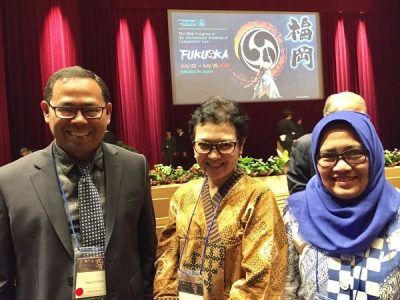To Develop Comparative Law, 3 Lecturers Represent Indonesia at A World Congress
The development of comparative law is increasingly urgent so that Indonesian legal reform is not misdirected in adopting a foreign law.
Comparative law is a field of legal studies that has been known since the second half of the twentieth century. Unfortunately, there has not been a significant development in the field of study in Indonesia. None the less, three Indonesian legal experts recorded the history as the first Indonesia’s representative for The 20th Congress of the International Academy of Comparative Law (IACL) in Fukuoka City, Japan, which was attended by hundreds of comparative law experts around the world.
The Congress which took place on July 22-28, 2018 was indeed routinely held every four years by the IACL based in Paris, France. This year’s Congress is held in collaboration with Kyushu University in Fukuoka, Japan. The importance of this academic forum was seen from the opening of the Congress that was attended by the Prince of the Japanese Empire along with the Japanese ministers, governors, and supreme judges.
There are only three Indonesian legal scholars who become members of the IACL and are entitled to attend the prestigious world-class congress, Prof. Dr. Topo Santoso, SH, MH from the Faculty of Law, Universitas Indonesia (FHUI), Prof. Susi Dwi Harijanti, SH, LL.M. , Ph.D. from the Faculty of Law, Padjadjaran University (FH UNPAD), Bandung, and Koesrianti, SH, LL.M., Ph.D. from the Faculty of Law, Airlangga University, Surabaya.
Besides attending a series of activities i.e. workshops, discussions, and seminars by leading comparative law experts from five continents, Prof. Topo Santoso participated as a resource speaker for the theme of Southeast Asian Perspectives of Comparative Law. Professor of Criminal Law who served as Chairman of Comparative Law Lecturer Association of Indonesia presented a paper entitled Legal Pluralism in Indonesia.
The Urgency of Comparative Law
Ratno Lukito, in his book “Comparative Law: Theory and Method Debates” describes two levels of comparative law. At the macro level, comparisons are made on the aspects of the legal system . While the micro level focused on the legal substance aspects. Both are equally used in various legal developments by adopting from foreign law.
Prof. Topo Santoso shared his view of the matter comparative law to hukumonline. According to him, comparative law study can be done in every legal field. He explained that more and more legal research papers with a comparative law approach are used for the sake of law reform in Indonesia.
“The government, the policymakers can learn from it, how the development in other countries,” said the former Dean of FHUI.
He also noticed that comparative legal studies have been used by various developed countries in the world for the benefit of diplomatic and business relations. “They study the laws of various interaction partner countries. So when there is a relationship it can be established so much easier,” he said.
Whereas Prof. Susi emphasized the importance of greater attention in the development of comparative legal studies as various legal reforms in Indonesia increasingly adopted the concept of foreign law. Including countries with different legal systems from Indonesia.
“In a global world, it is impossible for a country to be isolated from other countries,” said the Professor of Constitutional Law at the Faculty of Law of UNPAD.
According to her, currently, there has been a convergence between concepts of the civil law system with the common law system. Comparative law is increasingly important to be studied more deeply, especially on law schools.
Both Topo and Susi emphasized on the importance of deepening the comparative law in various developments in Indonesian law so that there would be no misguided ‘legal transplants’ from the concept or legal substance of other countries. Whereas, every concept and legal substance relates to the unique values of each country of origin. “Not just taking, transplanting, in order to avoid misuse,” Susi explained.
As a fellow Law Professor from two of Indonesia’s leading law campuses, both of them acknowledged that comparative law on their respective campus has become a part of the curriculum of the undergraduate to the doctoral program. It’s just that the packaging is still partially limited in each field of study. It is not a compulsory subject either. For example comparative criminal law courses or comparative constitutional law.
Both agree that the prospect and urgency of comparative law need to be addressed better through the law school curriculum. For example by opening the comparative law course as a stand-alone class. “Students need to be given the knowledge of how to compare appropriately. Usually, for instance, we compare apple to apple, but can we compare apple to orange?” said Prof. Susi.
Prof. Topo Santoso said the development of comparative law in Indonesia began to increase with the formation of the Association of Comparative Law Lecturers of Indonesia in 2014. Currently, there are more than 60 members from dozens of state and private law schools throughout Indonesia.
This association has held a series of national and international conferences, comparative law curriculum workshop, national seminars, and pioneered the comparative law journal in English “Comparative Law Review”.
In the era of globalization and the era of intensive international cooperation today, the comparative law is a necessity. Hopefully, the quality of legal reform in Indonesia is increasing, supported by better comparative law studies in the future.
Source: http://www.hukumonline.com/berita/baca/lt5b602957f1773/kembangkan-i-comparative-law-i–3-dosen-wakili-indonesia-di-kongres-dunia

